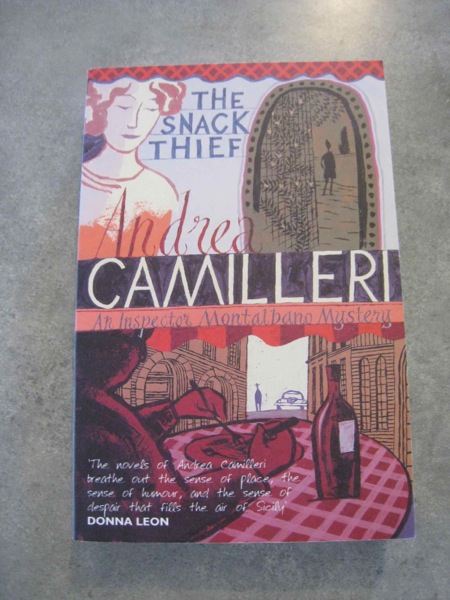Andrea Camilleri The Snack Thief

While you tend to get the impression almost everything that happens in Sicily is somehow connected to the Mafia, the third Montalbano book, The Snack Thief, is almost totally Mafia-free.
On the surface, there’s no apparent link between the death of Aurelio Lapècora, an aging businessman, stabbed in an elevator, and a fishing trawler crewman machine-gunned by a Tunisian patrol boat. Only readers of crime fiction who recognize a standard modus operandi in the genre and Montalbano, that supreme student of human nature are likely to make the connection.
The fisherman’s death is the type of case that suits Montalbano’s deputy, Mimi Augello and, on the surface, things in that department seem relatively straight-forward. Meanwhile, Montalbano’s investigation into the stabbing gains complexity as it goes along.
It’s soon obvious that one of the keys to the case is Karima, the Muslim cleaning woman at Lapècora's office, who’s in the habit of performing extras for an elderly male clientele (Lapècora is not the only one), but she disappears, along with her son François, who, when he’s found, has been surviving by stealing lunches from schoolchildren.
Karima isn’t only the mother of the snack thief. She is also, it turns out, the sister of the dead fisherman. When he finds the boy Montalbano fits the pieces together, exposing a wide-ranging plot fuelled by high-level corruption. Although warned to keep his distance, Montalbano dives headlong into the thick of things with a plan to set things right.
Montalbano’s sympathies with the kid’s predicament are the basic motivation behind the plan, but, as ever, there’s an additional complication in the form of jealousy as François’ increasing closeness to Livia threatens to leave him the odd man out. In the end, of course, everything works out, and does so in a way that keeps François in the picture as a complicating factor in the relationship between Montalbano and Livia.

